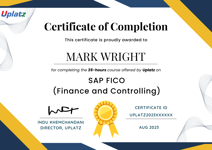
Software Engineer Career Path
Self-paced videos, Lifetime access, Study material, Certification prep, Technical support, Course Completion Certificate
Uplatz
Summary
- Uplatz Certificate of Completion - Free
Add to basket or enquire
Overview
Uplatz provides this powerful and extensive Career Path program to help you become a Software Engineer. It is a program covering all topics related to Software Engineering and Technology in the form of self-paced video tutorials. You will be awarded Course Completion Certificate at the end of the course.
A Software Engineer is a person who applies engineering principles and knowledge of programming languages to design, develop, test, and maintain software applications. Software engineers can work on different types of software, such as systems software, applications software, web software, mobile software, and more. Software engineers can also specialize in different domains, such as artificial intelligence, data science, cybersecurity, gaming, etc.
Software engineering is a branch of computer science that deals with the creation and improvement of software solutions for end users. Software engineering involves applying scientific and mathematical methods to analyse, design, implement, verify, and maintain software systems. Software engineering also requires skills such as communication, teamwork, problem-solving, creativity, and ethics.
If you are interested in becoming a software engineer, you will need to have a strong background in computing and mathematics. You will also need to learn various programming languages and tools that are relevant to your chosen field of software engineering. You can study software engineering at university or through online courses. There are many opportunities for software engineers in various industries and sectors, as software is essential for almost every aspect of modern life.
Course media
Description
Here are some common roles and responsibilities that most software engineers might have:
Software Development: Design, code, test, and maintain software applications and systems to meet user requirements and business needs.
Requirements Analysis: Collaborate with stakeholders to gather and analyze requirements for software projects, ensuring a clear understanding of the desired functionality.
Design: Create technical designs and architectures for software solutions, including database designs, user interfaces, and system components.
Coding: Write high-quality, efficient, and maintainable code using programming languages and best practices. Debug and troubleshoot code issues.
Testing: Develop and implement testing strategies to identify and fix bugs, ensure software quality, and validate that the software meets requirements.
Version Control: Use version control systems (e.g., Git) to manage codebase changes, collaborate with team members, and track development progress.
Deployment: Deploy software applications to production environments, ensuring smooth and reliable release processes.
Maintenance: Provide ongoing support and maintenance for software applications, including bug fixes, updates, and performance optimizations.
Documentation: Create technical documentation, including design documents, user guides, and API documentation, to aid in understanding and using the software.
Collaboration: Work closely with cross-functional teams, such as product managers, designers, quality assurance testers, and other engineers, to deliver comprehensive software solutions.
Continuous Learning: Stay up-to-date with the latest technologies, programming languages, and industry trends to continuously improve skills and contribute innovative ideas.
Problem Solving: Analyze complex technical challenges and devise creative solutions to overcome them.
Code Review: Participate in code reviews to ensure code quality, consistency, and adherence to coding standards.
Performance Optimization: Identify and address performance bottlenecks in software applications to improve efficiency and user experience.
Security: Implement security best practices to safeguard software applications against potential vulnerabilities and threats.
Agile Development: Work within Agile methodologies, such as Scrum or Kanban, to manage and track project progress through iterative development cycles.
Mentoring: Provide guidance and mentorship to junior software engineers, sharing knowledge and helping them grow in their roles.
Remember that these responsibilities can vary depending on the specific role and company. Some software engineers might specialize in certain areas like front-end development, back-end development, mobile app development, machine learning, or DevOps, which can further influence their roles and responsibilities.
Who is this course for?
Everyone
Requirements
Enthusiasm and passion to achieve your goals!
Career path
- Software Engineer
- Mid-Level Software Engineer
- Senior Software Engineer
- Technical Lead
- Engineering Lead
- Software Developer
- Programmer
- Lead Software Engineer
- Principal Software Engineer
- Staff/Engineering Manager
- Director of Engineering
- Engineering Director
- Vice President of Engineering
- Chief Technology Officer (CTO)
- Data Analyst
- IT Consultant
- Technology Consultant
Questions and answers
Currently there are no Q&As for this course. Be the first to ask a question.
Certificates
Uplatz Certificate of Completion
Digital certificate - Included
Course Completion Certificate by Uplatz
Reviews
Currently there are no reviews for this course. Be the first to leave a review.
Legal information
This course is advertised on reed.co.uk by the Course Provider, whose terms and conditions apply. Purchases are made directly from the Course Provider, and as such, content and materials are supplied by the Course Provider directly. Reed is acting as agent and not reseller in relation to this course. Reed's only responsibility is to facilitate your payment for the course. It is your responsibility to review and agree to the Course Provider's terms and conditions and satisfy yourself as to the suitability of the course you intend to purchase. Reed will not have any responsibility for the content of the course and/or associated materials.



